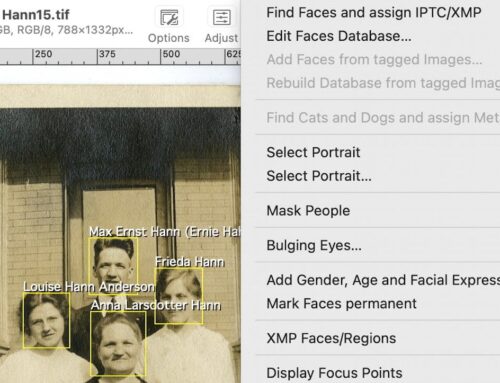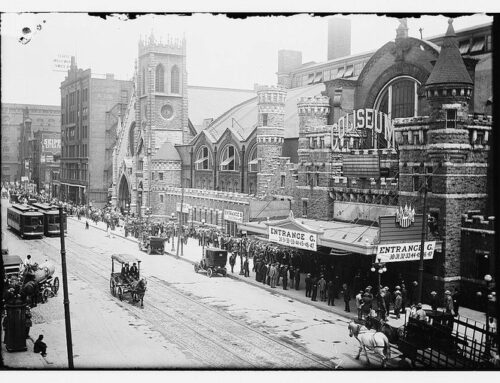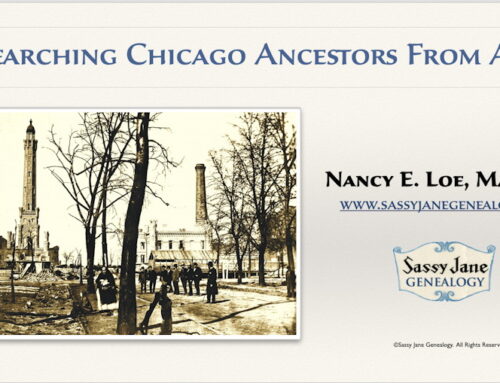In 2010, I started searching for McFadzean ancestors in Ayrshire, Scotland.
More specifically, I’m searching for my husband’s great-great-grandmother Janet McFadzean Mackie, in Kilbirnie. Her maiden name was spelled McFadden in U.S. records. Initially, when I searched Scottish records for the surname spelled McFadden, I had zero results. As I’ve worked on this line over the years, I’ve developed some search strategies for Scottish records I’ll show you here.
Mackies in Kilbirnie, Ayrshire, Scotland
I began my search with Janet’s husband, John Mackie, born in Kilbirnie in Ayrshire on 27 Aug 1826. After they emigrated, John and Janet’s children spelled their surnames either as Mackey or Mackie. As I searched the Mackey/Mackie line, I discovered the following surnames could all mean the same family: Mackie = Mackey = McKay = MacKay = M’key = McKie.
And then there’s pronunciation. My husband and I were in Edinburgh last summer. He decided he wanted a kilt, so we told the tailor his clan was Mac-EEE and very quickly learned that it’s pronounced Ma-KAI. But they were happy to sell him a full rig with the Ma-KAI tartan anyway. He looks so handsome in it – pictures available on request!
 Searching Variant Scottish Names
Searching Variant Scottish Names
As I continued my Scottish research over the years, I began to understand just how flexibly Scottish surnames were spelled. Fortunately, Scottish record databases understand this dilemma. Their search interfaces often build in robust ways was to alter name searches, illustrated in the image at right from ScotlandsPeople. Always take advantage of any search option offered for variant Scots surnames.
And it’s not just surnames. For example, the forename Jean could also be found in records as Jane, Janet, or Jeanne. Christian (a female forename) and Christina were often used equivalently.
Searching for McFadzean
Or is it McFadyen, McFayden, McFadden, McFadyan, McFeat, McFudzen, McFadgean, or … McBeth?
Changing my search to allow for name variants provided many illuminating results (illustrated below) when searching the 1841 Scotland Census. I knew Janet was born about 1828 and lived in Kilbirnie, Ayrshire. Janet McFADGEAN, the 13-year-old cotton mill worker, is the person I was looking for. But this search educated me to surname variants I could never have imagined. Being familiar with these surname variants helps any future searches I do.
Searching for McFadzean marriage records, I found Janet McFADZEAN married John MacKie in 1846. (see featured image above). In a marriage record abstract, they appear as Janet McFADYEN and John MACKEY. In 1848, they emigrate to America with their son, Matthew. Their first home in America was in Cass, Schuylkill, Pennsylvania. Shortly after that, they settle in Truro Township, Knox County, Illinois.
In a profile of John Mackie published in an 1878 history of Knox County, Illinois, John’s wife appears as Janett McFAYDEN. In her son’s marriage record, she appears as Jennett McFADYEN. And in another son’s death certificate, she’s Janet McFADDEN.
Which Surname To Use
I solved the fairly common genealogy problem of which spelling, among many choices, to use. I use the one I encountered most frequently: McFADZEAN. Then I noted the alternatives in my family tree software. According to this site, McFadzean is a “Scottish patronymic surname meaning ‘son of little Patrick.’ The Celtic prefix ‘Mc’ means ‘son of,’ while ‘Fadzean’ is a derivative of the Gaelic Pháidín, meaning ‘little Patrick.’”
However, I am still searching for Janet’s birth or baptism. The hunt continues, using variant surnames in all my searches. And I have to admit I’m rooting for my husband to be related to actor Matthew McFadyen because: 1. I’ll bet his ancestors could spell their names, and 2. I’m sure he would invite us to join him and his wife at their UK country estate on a regular basis.
If you’d like to know more about searching Scottish records effectively, try Sassy Jane’s Guide to Finding Scottish Ancestors Online.
In this Sassy Jane Guide you’ll learn about familiar and less-known websites and databases for finding Scottish records, from the 1560s to the recent past. Many records are indexed and digitized, making Scottish records fun and illuminating to use.
Discover the best ways to search records from Scotland and where to find supporting resources, including help locating place names, deciphering Scottish handwriting, and researching clans and tartans. Add new research skills and watch your Scottish family tree flourish with this downloadable e-book. Click this link for more information or to buy,







Leave a Reply